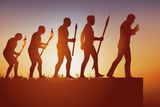
News
September 23, 2025
Culture Could Be Driving Human Evolution and Turning Us Into Superorganisms
Learn why some researchers say that our culture – not genetics – is driving our evolution and what that could mean for our future.
**Culture: The New Driver of Human Evolution? Are We Becoming Superorganisms?**
For centuries, the prevailing understanding of human evolution has centered on genetics – the slow, gradual changes in our DNA that adapt us to our environment. But a growing number of researchers are proposing a radical shift in this perspective, suggesting that culture, not genetics, is now the primary engine of our evolutionary journey. This bold claim raises profound questions about what it means to be human and where we are headed as a species.
So, what exactly does it mean for culture to drive evolution? Traditionally, natural selection favored individuals with genes that gave them a survival advantage. Those individuals were more likely to reproduce, passing on those beneficial genes to the next generation. However, proponents of the "cultural evolution" theory argue that our capacity for learning, sharing knowledge, and creating complex societies has created a new layer of selection pressure.
Think about it: we learn skills, technologies, and social norms from each other. These learned behaviors, passed down through generations, can significantly impact our survival and reproductive success. For example, the development of agriculture allowed for larger, more settled populations. This wasn't a genetic adaptation, but a cultural one. Those societies that adopted agriculture thrived, while those that didn't often struggled.
This cultural transmission of knowledge, skills, and practices allows us to adapt to rapidly changing environments much faster than genetic evolution ever could. Instead of waiting for beneficial genes to arise through random mutation, we can learn from each other and innovate, creating new solutions to challenges in real-time.
The implications of this cultural drive are far-reaching. Some researchers even suggest that it's leading us towards becoming "superorganisms" – highly cooperative groups where individuals function as interdependent parts of a larger whole. Bees and ants are prime examples of superorganisms, where individual insects work tirelessly for the benefit of the colony.
While humans retain individuality, our increasing interconnectedness through technology and globalization, coupled with our reliance on shared knowledge, points to a similar trend. The internet, for example, allows for instant communication and collaboration on a global scale, fostering a collective intelligence that far surpasses the capabilities of any single individual.
The idea that culture is driving our evolution, potentially turning us into superorganisms, is still a subject of debate. However, it presents a compelling alternative to traditional evolutionary models and offers a fascinating glimpse into the possible future of humanity. It highlights the power of learning, collaboration,
For centuries, the prevailing understanding of human evolution has centered on genetics – the slow, gradual changes in our DNA that adapt us to our environment. But a growing number of researchers are proposing a radical shift in this perspective, suggesting that culture, not genetics, is now the primary engine of our evolutionary journey. This bold claim raises profound questions about what it means to be human and where we are headed as a species.
So, what exactly does it mean for culture to drive evolution? Traditionally, natural selection favored individuals with genes that gave them a survival advantage. Those individuals were more likely to reproduce, passing on those beneficial genes to the next generation. However, proponents of the "cultural evolution" theory argue that our capacity for learning, sharing knowledge, and creating complex societies has created a new layer of selection pressure.
Think about it: we learn skills, technologies, and social norms from each other. These learned behaviors, passed down through generations, can significantly impact our survival and reproductive success. For example, the development of agriculture allowed for larger, more settled populations. This wasn't a genetic adaptation, but a cultural one. Those societies that adopted agriculture thrived, while those that didn't often struggled.
This cultural transmission of knowledge, skills, and practices allows us to adapt to rapidly changing environments much faster than genetic evolution ever could. Instead of waiting for beneficial genes to arise through random mutation, we can learn from each other and innovate, creating new solutions to challenges in real-time.
The implications of this cultural drive are far-reaching. Some researchers even suggest that it's leading us towards becoming "superorganisms" – highly cooperative groups where individuals function as interdependent parts of a larger whole. Bees and ants are prime examples of superorganisms, where individual insects work tirelessly for the benefit of the colony.
While humans retain individuality, our increasing interconnectedness through technology and globalization, coupled with our reliance on shared knowledge, points to a similar trend. The internet, for example, allows for instant communication and collaboration on a global scale, fostering a collective intelligence that far surpasses the capabilities of any single individual.
The idea that culture is driving our evolution, potentially turning us into superorganisms, is still a subject of debate. However, it presents a compelling alternative to traditional evolutionary models and offers a fascinating glimpse into the possible future of humanity. It highlights the power of learning, collaboration,
Category:
Technology